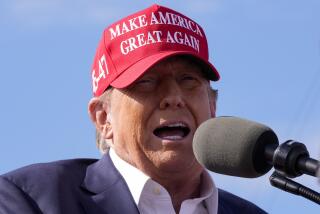Still Waiting for the ‘Ethical Revolution’ : Gingrich’s GOPAC scarfs up shadowy contributions
- Share via
Three days after the Republicans’ thumping congressional victory last November, Newt Gingrich vowed an ethical revolution, to sweep away years of clubby Democratic deal-making in the informational shadows. “Information will be available to every citizen in the country at the same moment that it is available to the highest-paid Washington lobbyist,” said the Georgia representative, now Speaker of the House. He added, “It will change the way people will try to play games in the legislative process.”
Good words. Too bad Gingrich has been so slow to apply them to his own GOP Action Committee, or GOPAC, the elusive entity that has raised millions in recent years and played a key role in the Republican victory. A series of leaks identifying GOPAC’s secret donors--compounded by its resistance to full disclosure--does not augur well for hopes that the Republicans will eliminate the conflicts of interest and other ethical lapses they say marred the 40-year Democratic control of the House.
Since Gingrich became general chairman of GOPAC in 1986, the Republicans have used it, at the least, to skirt the spirit of federal laws limiting campaign contributions. Because it says it supports mainly state and local candidates, it claims exemption from registering as a federal political action committee. From 1986 through 1993, it received contributions from prominent conservatives well in excess of federal limits--much of the money coming from corporate executives seeking special legislation or facing significant federal regulatory problems.
GOPAC says it is exempt from disclosure laws because it gives only 10% to federal candidates. In 1991, under pressure, it thus agreed to report 10% of its contributions to the Federal Election Commission. But half the 136 Republican freshmen in Congress were GOPAC beneficiaries, using its advice and training materials if not its money. And Gingrich has used GOPAC money to travel the country to support GOP congressional candidates.
GOPAC says its donors are shy about publicity. Little wonder. A partial list published in The Times on Sunday suggests more than just bashfulness. Roger and Gerrish Milliken, brothers who manufacture textiles in South Carolina, have given at least $350,000. Is it coincidence that Gingrich in 1990 supported a Milliken-backed bill to impose new quotas on imported textiles and clothing? Then there was nearly $75,000 from owners of Flowers Industries, a bakery company being investigated by the Justice Department for possible bid-rigging, and $80,200 from the president of Southwire Inc., a Georgia firm indicted in 1992 on charges of exporting contaminated fertilizer. Hundreds of thousands have come from executives with dealings before the Food and Drug Administration, an agency that Gingrich promises to emasculate.
GOPAC has made public the names of those who have made donations since the November election. That is not good enough. It should register as a federal political action committee and make itself subject to the same contribution limits imposed on others. And it should give a full accounting of who gave what in the years before the election.
Gingrich is no longer howling from the wilderness of opposition. He is the Speaker. As such, he has shown remarkable insensitivity to appearances of conflict of interest, in his initial acceptance of a $4.5-million advance on a book to be published by a company owned by Rupert Murdoch, a media baron seeking congressional favors, and in refusing to release his tax returns. We take Gingrich at his word that he wants a more open, accountable Congress. Now all he must do is turn his word into action.
More to Read
Get the L.A. Times Politics newsletter
Deeply reported insights into legislation, politics and policy from Sacramento, Washington and beyond. In your inbox twice per week.
You may occasionally receive promotional content from the Los Angeles Times.










